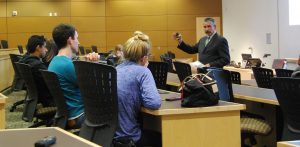April 29, 2015
By Rumasa Noor
In 2013, the former appointed comptroller and treasurer of Dixon, Rita Crundwell was found guilty of misappropriating money from Dixon, Illinois. She had been stealing money from the city for two decades and had stolen more than anyone else in the city’s history, according to Mike Yankunas, leader of Forensic Services at Wipfli.
The city asked Yankunas to investigate the case and figure out how Crundwell was able to misappropriate that much money for so long. Yankunas found out that Crundwell had fooled the town of Dixon into believing that she was making money off her “horse operations, which was being funded by the illegal funds that were moving out of the city of Dixon’s bank accounts,” Yankunas said.
The former UW-Whitewater alumnus investigates fraudulent cases for a living, and has come across hundreds of cases of fraud. He was invited by UW-W to speak about fraud and ethics during Business Ethics Week on April 23.
Yankunas talked about several companies and individuals who have been involved in fraudulent activities over the period of time, and in some cases had taken not only themselves down, but also their whole organizations. One such case was Enron, an energy company that collapsed in 2001 partly due to the “questionable accounting” practices, according to BBC News.
Yankunas said the company’s fall gave birth to Sarbanes-Oxley Act (SOX) in 2002.
Yankunas feels really strongly about this issue, and said he likes to get the message across.
“Unfortunately, I see too much fraud, that’s why I feel strongly about talking about it,” he said.
In his experience, he said that people think and act more selfishly now than they did in his younger years. People make decisions based on what they think is best for them regardless of ethics.
Yankunas discussed the fraud triangle, which consists of three factors: the need, opportunity and rationalization for fraud. More often than not fraud starts with a personal need. Most people commit fraud when they have a financial need. Then they find the right opportunity to do it, and once they get the opportunity, they rationalize their decision and find reasons to justify committing fraud.
People who commit fraud always find ways to hide it, otherwise they would get in trouble, said Yankunas.
“The common theme in all of these [cases of fraud] is that somebody chose at some point to make a decision, a personal decision that they were going to do something they knew they shouldn’t have done,” according to Yankunas. “The other common thread in every fraud is that you must conceal it in order for it to be successful.”
He said private companies outnumber public companies and are more prone to fraud largely because they have weaker control structures.
Companies need to have a risk assessment plan and a fraud response to properly respond to any fraudulent activities. They also need to have an ethics statement, which should say how the company wants to present itself to the community, customers and their workers, according to Yankunas.
“Typical organizations would lose five percent of their top-line annual revenue in fraudulent losses on an annual basis; that’s a frightening number,” Yankunas said. “Five percent is a big number to just throw out the window because somebody could decide they are going to do something dishonest.”
The investigator said ethics should be involved in all of our life decisions.
Student Madeline Peplinski said the presentation made her realize that “fraud is everywhere.”
“You have to be aware of that as you are going in to the business world. It’s something that we are a little naive to so it was a nice refreshing take on that,” Peplinski said.


